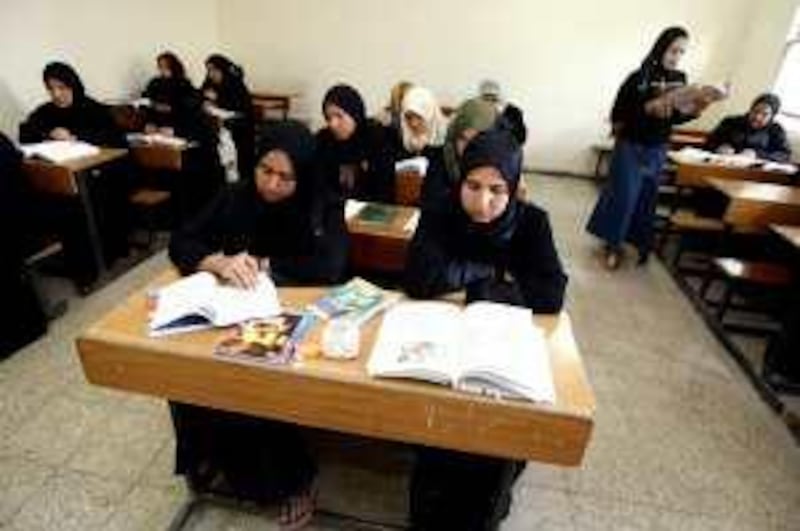NEW YORK // Women continue to struggle to gain equal access to education, the job market and political life in much of the Arab world, according to the UN's latest report on combating poverty. The yearbook on the Millennium Development Goals (MDGs), released by Ban Ki-moon, the UN secretary general, reveals that global economic slump is undermining attempts to tackle hunger, illiteracy and gender equality.
Researchers highlight the "particularly dismal" progress on women's rights in parts of the Arab world, where women suffer as second-class citizens in politics, education and the workplace. The so-called Western Asia region, which encompasses Arabia, the Levant, Iraq, Turkey and Cyprus, has a disproportionately low number of girls in schools and what researchers describe as "extremely low" job prospects for women.
"Women have also struggled to advance in political representation, holding only nine per cent of parliamentary seats" in the region, the report said, highlighting the absence of women parliamentarians in Saudi Arabia and the 35-member Qatari Advisory Council. "There are some encouraging signs, but much more work needs to be done," said Fethi Debbabi, a Cairo-based spokesman for the UN. "We need to increase our efforts in empowering the women of this region, giving them better representation and more say in political affairs."
Sonja Kelly, who headed a study this year called Women's Rights in the Middle East and North Africa, for the US-based advocacy group Freedom House, cautioned against being overly critical of a region that shows signs of progress. Members of the six-nation Gulf Co-operation Council - the UAE, Saudi Arabia, Oman, Qatar, Bahrain and Kuwait - had made important strides in recent years, she said. The appointment of Nora bint Abdullah al Fayez as Saudi Arabia's first woman minister in February highlighted a growing trend to offer Gulf women jobs in governments, embassies and the judiciary.
"Things have got better over the last five years and governments have invested more heavily to engage women and improve their status," said Ms Kelly. "It remains to be seen whether that trajectory will continue with the global economic situation deteriorating so significantly, and whether women will remain on the agenda in the years to come." Women's empowerment is one of eight UN targets designed to boost wealth, health and quality of life in poor and developing countries by 2015. The MDGs were adopted in 2000 and aim to cut extreme poverty by half, educate all children and reverse the Aids pandemic.
Speaking in Geneva on Monday, Mr Ban warned that "the current economic environment makes achieving the goals even more difficult" with global recession, unemployment and food price hikes likely to push millions more towards hunger. Speaking in advance of today's Group of Eight summit of industrialised nations, in L'Aquila, Italy, Mr Ban called on members to "scale up aid to Africa over the next year" to meet poverty-reduction targets.
The UN secretary general said the total annual aid flow to Africa remains at least US$20 billion (Dh73.4bn) below what world leaders pledged at a summit in Gleneagles, Scotland, in 2005, where G8 members promised to increase aid to sub-Saharan Africa by $25bn a year by 2010. This week's 56-page MDG progress report reveals that between 1990 and 2005, the number of people living in extreme poverty on less than $1.25 a day decreased from 1.8 billion to 1.4 billion.
But across Western Asia, the same period saw the number of those living in poverty almost quadruple from 3 million to 12 million. The war in Iraq, violence between Israelis and Palestinians and associated refugee problems gave the region a poor average. Across Western Asia, officials estimate that the percentage of poverty-racked people with jobs but unable to support their family rose from 10 per cent to about 25 per cent from 2007-8.
Mr Debbabi described a "fragile situation" emerging where the percentage of those in extreme poverty, on less than $1.25 a day, increased from two per cent to six per cent between 1990 and 2005. The spokesman urged oil-rich Gulf countries to boost funding to turbulent parts of the Arab world, including Iraq and the Palestinian territories. "They could play a major role in supporting the UN's development efforts," he said.
jreinl@thenational.ae







